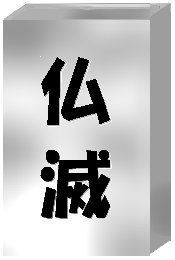
The meaning of Butsumetsu in the Rokuyō calendar is 'bad luck all day', making it unwise to do anything important. It's the day when the universe has a weird sense of humour - at your expense.
Life is full of important events, some of which cannot be rescheduled. However, activities such as moving house, starting a new venture, having a wedding ceremony, etc. Better to just sit tight and wait for tomorrow.
Some people believe that falling ill on a Butsumetsu day means the illness will drag on for ever. Of course, psychosomatics demonstrate that the same thing happens if you believe it hard enough - our brains are wonderful like that.
As shown above, Butsumetsu is portmanteau of 仏 (butsu) and 滅 (metsu). The butsu comes from the name 'Buddha'.
Why?
Well, many English websites erroneously state - or at least imply - that Butsumetsu is the day Buddha died, but that's not true.
In Japan, Buddha’s death is traditionally observed on 8 or 15 February (old lunisolar calendar), but the exact year varies depending on the Buddhist tradition - some say 949 BCE,1 others 483 BCE, and some just shrug and say “a long time ago.”
So no, Butsumetsu is NOT about remembering Buddha’s death. The critical root of the word 'Butsumetsu' is 'metsu' which means annihilation, the emptiness following the total and absolute destruction of everything. It represents a calamity so great that even the Buddha would be unable to counter it and would perish.
Originally, the Rokuyō day was called 'Kumo' or 'Kyōmo', meaning 'the existence of something that doesn't exist'. This was later interpreted as 'the emptiness of everything' and called 'the death of everything'. Eventually, the kanji for 'everything' was replaced with the kanji for 'Buddha' to emphasise the enormity of the destruction - even the Buddha himself could not overcome it. So if even Buddha couldn’t survive this day, the rest of us have no chance at all.
Today, some Buddhist sects interpret Butsumetsu not as total annihilation but as a moment of transition - aligning with the concept of samsara (cycle of rebirth). Destruction leads to renewal.
For example, Nichiren Buddhists don't view Butsumetsu as purely negative. Instead, they see it as a moment when faith becomes most critical. Nichiren himself taught that after the historical Buddha’s passing, the world entered the age of Mappō (Latter Day of the Law), a time of spiritual decline. However, he believed that through mantric chanting Nam-myoho-renge-kyo, people could attain enlightenment even in an age of chaos. For Nichiren Buddhists, Butsumetsu can symbolise the end of one phase and the opportunity for new spiritual growth. In other words, not a disaster - more like a wake-up call.
In Pure Land Buddhism (Jōdo-shū & Jōdo Shinshū), Butsumetsu is sometimes interpreted in a more hopeful way than annihilation. The idea is that after the Buddha's passing, sentient beings can still achieve salvation by relying on Amida Buddha’s compassion rather than their own efforts. The concept of muen-gedatsu (liberation from worldly attachments), also aligns with the idea that Butsumetsu is not just destruction, but a step toward rebirth in Amida’s Pure Land. In other words, once things hit rock bottom, the only way is up.
Some interpretations in Tendai Buddhism, influenced by Chinese Tiantai teachings, align Butsumetsu with the santai (Three Truths Doctrine), which includes kū (emptiness) as a necessary stage in realisation. Metsu (destruction) is not absolute but part of a cycle leading to transformation. Basically, think of Butsumetsu as the Buddhist equivalent of a system reboot.
As a final point of interest; life as we know it continues, and new things begin. Therefore, an alternative interpretation of Butsumetsu is that it's a great day for starting afresh. No need to wait for the next Rokuyō day, the lucktastic Taian.
Butsumetsu can lead to financial benefits too. Since Butsmetsu is considered inappropriate for having a wedding ceremony, wedding halls might offer a discount for weddings on those days. If you’re not superstitious, it’s a great way to save some yen.
Some businesses refuse to sign contracts on Butsumetsu, allowing their bolder competitors to swoop in and steal the deal.
Should you fear butsumetsu?
That depends:
At the end of the day, Butsumetsu is what you make of it.